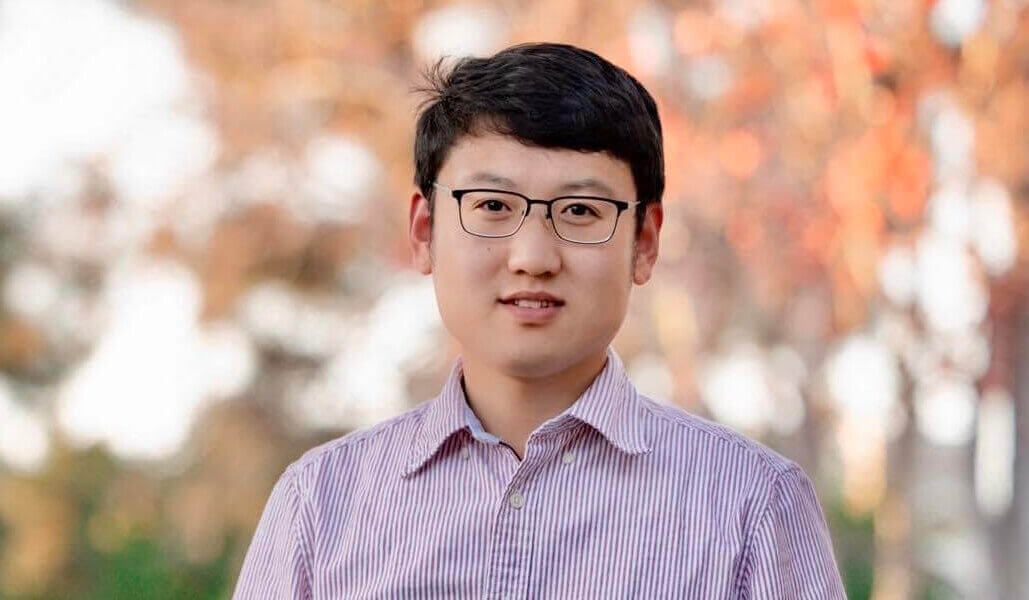
Longwei Liu joins USC Viterbi and the Wang Lab to uncover the secret interactions between immune cells and cancer cells with the help of fluorescent trackers.
Through the lens of a microscope, Longwei Liu watches as a tiny speck of light squirms inside a dark cell. A T-cell is fighting a battle of life or death—attacking a cancerous tumor cell.
Cancer is one of society’s most devastating diseases, with about 609,360 people dying annually, according to the American Cancer Society. For Dr. Liu, an assistant professor of research at the Alfred E. Mann Department of Biomedical Engineering, curing cancer is an obsession. With the help of a microscope and fluorescent proteins, he illuminates the struggle between the body’s immune cells and cancer cells.
Liu, who joined the USC Viterbi School of Engineering this year, focuses on better understanding intracellular signaling for immune-tumor cell interactions. He does so as part of the Wang Lab.
“We need to be able to observe and understand these interactions, so we can make steps to strengthen our immune cells and make the cancer-fighting process more efficient,” he said.
He does this by developing molecular biosensors that help visualize signals inside the cell. This method uses fluorescence resonance energy transfer (FRET) technology, which involves attaching a genetically encoded biosensor to “light-up” a protein of interest. The illuminated protein allows researchers to observe what happens inside the cell.
“When you’re working at night, you can’t see anything. We need a flashlight to see what we’re doing and where we’re going,” he said. “In a similar manner, the biosensors help us observe what’s going on inside the cell and where these actions are happening. ”
With this insight, Liu leads his teams to significant breakthroughs in novel immunotherapy solutions that help T-cells target solid tumors.
Before coming to USC, Liu worked with fluorescence resonance energy transfer (FRET) to understand complex molecular processes. His experience working with FRET biosensors laid the foundation for the success of engineering single fluorescent protein biosensors, he said.
This FRET technology allowed for monitoring signaling events with high spatial and temporal resolution, but Liu wanted more than monitoring one signaling event at a time. He wanted to be able to track complicated molecular interactions within the cell. His expansion into novel single fluorescent protein biosensor and cell-manipulation research allows him to track how multiple components within the cell interact.
This innovation has allowed Liu to expand his research into immune cell and cancer cell interaction.
“In conventional immunotherapy, the T-Cells not only attack cancer cells, but they also attack our healthy tissues,” he said. “We want to develop a controllable approach to specifically activate immune cells in tumor regions.”
He hopes this will open doors for safer, and more efficient therapeutic approaches.
From China to California
Before coming to USC, Liu completed his B.S. in biotechnology at Shandong University in Shandong in 2013 and later received his Ph.D. in biomedical engineering from Tsinghua University in Beijing in 2018. From there, he completed his postdoctoral training at the University of California, San Diego, in 2022 with Peter Wang, the current Dwight C. and Hildagarde E. Baum Chair in Biomedical Engineering and professor of biomedical engineering and molecular microbiology & immunology at USC.
Liu’s time at UCSD opened his eyes to biomedical sensors for intracellular processes. He believed that within the biotechnology field, engineering was the most promising way for furthering future medical efforts.
“For me, seeing is believing,” Liu said. “These biosensor technologies really provide us with tools to see what’s happening inside cells in real time. It not only informs but motivates me to find creative ways to manipulate these cells to more effectively kill cancer.”
Since then, Wang has recruited Liu to join his lab at USC, praising Liu for his perseverance and willingness to undertake new biomedical challenges.
“This project [at Wang Lab] is particularly challenging and groundbreaking, as no one had undertaken such experiments before, and there was no immediate expertise available,” Wang said. “Liu continues to exhibit exceptional leadership in fundamental biomedical research and exceeded the already high expectations.”
Liu at the Wang Lab
At the Wang Lab, Liu spends his days engineering T-cells to amplify the desired function of targeting tumor-specific cells. With his colleagues, he tests many different engineering approaches to make the cells behave differently.
Thanks to the STTR SBIR Planning Award from USC, Liu is able to collaborate with Acoustic Cell Therapy. The company, for which Wang serves as chief consultant, is developing focused ultrasound-controllable CAR (FUS-CAR) T-cells for treating prostate cancer and potentially other types of solid tumors — to further explore genetically engineered immune cells.
The grant encourages researchers to collaborate with industry partners to commercialize their technology for clinics. With a grant of $150,00 for one year, Liu and Wang — co-principal investigators — are able to work with clinicians from the Keck School of Medicine of USC.
“USC Viterbi is well-known for its cutting-edge engineering achievements, but it’s also known to be a very collaborative environment,” Liu said. “Joining USC for biomedical engineering has connected me to many initiatives at Keck, and there is a very unique opportunity for this convergence between engineering and medicine.
